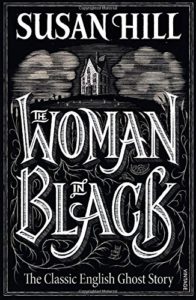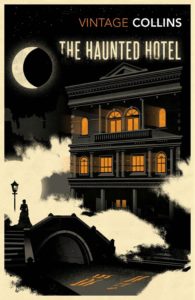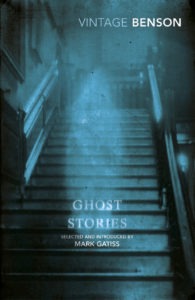Books
The lure of the supernatural
It is one of those unanswerable questions: why do many of us enjoy a ghost story in the depths of winter? Why are we drawn to this genre when the wind outside is wailing like the proverbial banshee? Many of us don’t read this kind of story in the summer with the chill of winter a distant memory.
 The ‘spine-tingler’ as it has become known has attracted writers from across the spectrum. Back in the day many felt it a climb down to write a crime novel, but they would be more than happy to put pen to paper to write a spooky tale. The list runs like a ‘Who’s Who’ of the literati: Mary Elizabeth Braddon, Oscar Wilde and Charles Dickens are the most well-known of the Victorian era when the ghost story reached new heights. Interest in the ghost story sprung from the explosion of the demand for séances. The Victorians had an unquenchable thirst for anything to do with the supernatural.
The ‘spine-tingler’ as it has become known has attracted writers from across the spectrum. Back in the day many felt it a climb down to write a crime novel, but they would be more than happy to put pen to paper to write a spooky tale. The list runs like a ‘Who’s Who’ of the literati: Mary Elizabeth Braddon, Oscar Wilde and Charles Dickens are the most well-known of the Victorian era when the ghost story reached new heights. Interest in the ghost story sprung from the explosion of the demand for séances. The Victorians had an unquenchable thirst for anything to do with the supernatural.
Writers who have dabbled with this genre include Conan Doyle, Charlotte Bronte, Elizabeth Gaskell, E. Nesbit, Edith Wharton, Saki, P.G. Wodehouse, Shirley Jackson, Helen Dunmore, A.S.Byatt, Penelope Lively, Celia Fremlin and Ruth Rendell. Of course, I can’t forget Susan Hill’s The Woman in Black which seems to have revived this genre singlehandedly.
Then you have the masters… M.R. James, Algernon Blackwood, Ambrose Bierce, Le Fanu, Poe, and Robert Louis Stevenson – and for me, Bram Stoker wrote one of the best ghost stories ever, The Judge’s House. These are all big names… and the list goes on.
 Some of these ghostly treats are still published today. The Haunted Hotel was the last work of Wilkie Collins. Originally published in 1878, Collins’ creepy tale starts in London with the shotgun romance and marriage of Lord Montbarry to the mysterious Countess Narona. On their honeymoon they rent a ramshackle building in Venice. It is there that people begin to disappear – or die. Collins is magnificently adept at building up tension in this macabre novella and is, as always, wonderful at characterisation.
Some of these ghostly treats are still published today. The Haunted Hotel was the last work of Wilkie Collins. Originally published in 1878, Collins’ creepy tale starts in London with the shotgun romance and marriage of Lord Montbarry to the mysterious Countess Narona. On their honeymoon they rent a ramshackle building in Venice. It is there that people begin to disappear – or die. Collins is magnificently adept at building up tension in this macabre novella and is, as always, wonderful at characterisation.
I greatly admire E F Benson’s wonderful Mapp and Lucia novels. What I didn’t know is that he also wrote what he called ‘spook stories’ – one collection was titled as such. Mark Gatiss writes in his introduction to Benson’s Ghost Stories that Benson had sat in on the very first of M R James’ Christmas ghost stories which have become legendary.
Gatiss’ first choice in this collection is ‘Spinach’, a tongue-in-cheek take on two siblings, Ludovic and Sylvia Byron – although their real names are the prosaic Thomas and Caroline Carrot, names they felt not glamourous enough for their séances. Given an opportunity to holiday for free in a client’s cottage, they begin to suspect there is a troubled soul with them. There are flashes of Benson’s wit. There is always a question as to whether Ludovic and Sylvia are the psychics they claim to be. Is it all grandstanding or can they actually see those who have passed over? The end is shocking, but rapidly descends in to farce.
 ‘In The Tube’ is a case of a man who sees a death before the actual death happens. This is a chilling and scary tale. Benson did not shy away from quite horrific description. As is to be expected of Benson, his tales are creepy and extraordinarily weird. Despite having read ‘Caterpillars’ some time ago, it has stayed with me all this time. It is a bizarre tale of a man’s stay at an Italian villa. One of the bedrooms is closed off, but during the night he remembers he forgot his book and discovers the door to the bedroom open. Looking in he sees a mound writhing on the bed – strange beasts that look like caterpillars but have the claws of a crab. What Benson does here is to personify a disease that still stymies medical science today. I wouldn’t call it a ghost story, but it is quite horrific simply by the fact that it is embedded in truth.
‘In The Tube’ is a case of a man who sees a death before the actual death happens. This is a chilling and scary tale. Benson did not shy away from quite horrific description. As is to be expected of Benson, his tales are creepy and extraordinarily weird. Despite having read ‘Caterpillars’ some time ago, it has stayed with me all this time. It is a bizarre tale of a man’s stay at an Italian villa. One of the bedrooms is closed off, but during the night he remembers he forgot his book and discovers the door to the bedroom open. Looking in he sees a mound writhing on the bed – strange beasts that look like caterpillars but have the claws of a crab. What Benson does here is to personify a disease that still stymies medical science today. I wouldn’t call it a ghost story, but it is quite horrific simply by the fact that it is embedded in truth.
So, back to my question… why do we read these macabre tales in the dead of winter? My own reasoning is that with the short days, long nights and the bleak weather, the stage is perfectly set for a ghost story. Maybe it also has to do with James’ legacy of reading a ghost story at Christmas. I am sure James did not feel that reading a ghost story on a hot summer’s night would have the same effect as read in winter with the wind (or is it a tortured spirit?) rattling the window frames? And why did Dickens embed his greatest ghost story over Christmas Eve night? Do we all want to be as scared as Scrooge when another ghost comes calling? If you are like-minded, then these two examples are perfect for chilling the bones. We have been promised plummeting temperatures in the coming weeks with a forecast of wind and snow. Now is a good time to be chilled to the bone while staying in the warm – but do beware of things that go bump in the night!
Check out our favourite ghost stories here.


Please note: Moderation is enabled and may delay your comment being posted. There is no need to resubmit your comment. By posting a comment you are agreeing to the website Terms of Use.